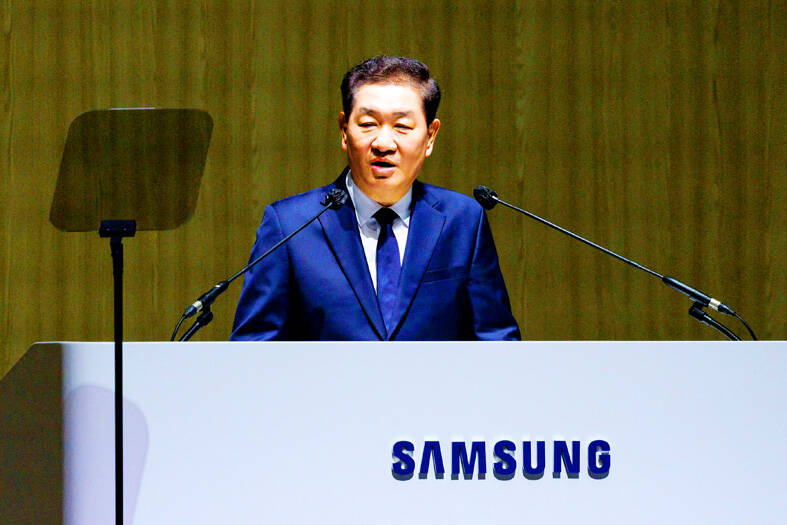Samsung Electronics Co yesterday said it is looking at major deals to drive growth, as it faced tough questions from shareholders after its failure to ride an artificial intelligence (AI) boom made it one of the worst-performing tech stocks last year.
The South Korean firm has been suffering from weak earnings and sagging share prices in recent quarters after falling behind rivals in advanced memory chips and contract chip manufacturing, which have enjoyed strong demand from AI projects.
Shareholders slammed management for poor stock performance and called for measures to revive stock prices at the meeting.

Photo: Reuters
Samsung co-CEO and head of semiconductor business Jun Young-hyun pledged to catch up in the high-bandwidth memory (HBM) chip race and apologized for the company’s poor stock performance.
“We were late in reading the market trends and we missed out on the early market as a result,” Jun said at the meeting.
Co-CEO Han Jong-hee told investors that this year would be a difficult year because of uncertainties surrounding economic policies in major economies, and that Samsung would pursue “meaningful” mergers and acquisitions (M&As) to address investor concerns about growth.
“There are some difficulties in doing semiconductor M&As due to regulatory issues and various national interests, but we’re determined to produce some tangible results this year,” he said.
In internal meetings, Samsung has acknowledged it has lost ground. This is particularly true in semiconductors, where it lags SK Hynix Inc in HBM chips that Nvidia Corp and others rely on for AI graphics processing units.
“Our technological edge has been compromised across all our businesses,” Samsung chairman Jay Y. Lee said in a message to an internal executive seminar.
“It’s hard to see that efforts are being made to drive big innovation or tackle new challenges. There are only efforts to maintain a status quo rather than shaking things up,” he said.
In recent years, Samsung has also lost market share to Taiwan Semiconductor Manufacturing Co (台積電) in contract chip manufacturing and to Apple Inc and Chinese rivals in smartphones.
Jun pledged to shareholders that this year would be “the year when we recover our fundamental competitiveness.”
Still, Samsung faces bigger headwinds than rivals from further US restrictions on high-end chip exports to China, as the country has become Samsung’s most important market thanks to chip stockpiling by Chinese firms.
Han said Samsung would flexibly respond to US President Donald Trump’s tariffs with its global supply chain and manufacturing footprints, while looking at options for US investments.
Samsung is South Korea’s most valuable company, with its market capitalization of US$235 billion accounting for 16 percent of the total value of the country’s main bourse. Nearly 40 percent of investors in South Korean stocks own Samsung shares, according to market data.

South Korea’s equity benchmark yesterday crossed a new milestone just a month after surpassing the once-unthinkable 5,000 mark as surging global memory demand powers the country’s biggest chipmakers. The KOSPI advanced as much as 2.6 percent to a record 6,123, with Samsung Electronics Co and SK Hynix Inc each gaining more than 2 percent. With the benchmark now up 45 percent this year, South Korea’s stock market capitalization has also moved past France’s, following last month’s overtaking of Germany’s. Long overlooked by foreign funds, despite being undervalued, South Korean stocks have now emerged as clear winners in the global market. The so-called “artificial intelligence

NEW IDENTITY: Known for its software, India has expanded into hardware, with its semiconductor industry growing from US$38bn in 2023 to US$45bn to US$50bn India on Saturday inaugurated its first semiconductor assembly and test facility, a milestone in the government’s push to reduce dependence on foreign chipmakers and stake a claim in a sector dominated by China. Indian Prime Minister Narendra Modi opened US firm Micron Technology Inc’s semiconductor assembly, test and packaging unit in his home state of Gujarat, hailing the “dawn of a new era” for India’s technology ambitions. “When young Indians look back in the future, they will see this decade as the turning point in our tech future,” Modi told the event, which was broadcast on his YouTube channel. The plant would convert

‘SEISMIC SHIFT’: The researcher forecast there would be about 1.1 billion mobile shipments this year, down from 1.26 billion the prior year and erasing years of gains The global smartphone market is expected to contract 12.9 percent this year due to the unprecedented memorychip shortage, marking “a crisis like no other,” researcher International Data Corp (IDC) said. The new forecast, a dramatic revision down from earlier estimates, gives the latest accounting of the ongoing memory crunch that is affecting every corner of the electronics industry. The demand for advanced memory to power artificial intelligence (AI) tasks has drained global supply until well into next year and jeopardizes the business model of many smartphone makers. IDC forecast about 1.1 billion mobile shipments this year, down from 1.26 billion the prior

People stand in a Pokemon store in Tokyo on Thursday. One of the world highest-grossing franchises is celebrated its 30th anniversary yesterday.